Results
News
Corinne Deloy,
Fondation Robert Schuman,
Helen Levy
-

Available versions :
EN

Corinne Deloy
Fondation Robert Schuman
Helen Levy
The democratic exercise of 29th May 2005 clearly shows that the referendum is still an instrument that can easily be used as a means of deflection especially when the economy is morose and the government unpopular. The victory of the NO vote can be interpreted as a national vote of sanction to be paid for by the European Union. According to an IPSOS survey the first reason quoted why people voted NO was to express their discontent with the "economic and social situation in France at the moment" (52%). According to the SOFRES, 40% of voters who chose to vote NO did so "as an expression of how fed up I am with the present political situation". The CSA poll revealed that when they voted 41% of the electorate interviewed primarily bore France's social situation in mind. Therefore we can deduce that the French perceived the election as a totally national one as they went to ballot on Europe.
Political forces at play.
From a point of view of commitment on the part of the political parties the YES vote was supported by four parties: the Greens, the Socialist Party, the UDF and the UMP. The NO vote was supported by nine parties including the Communist Party, three extreme leftwing parties - Lutte ouvrière, the Revolutionary Communist League and the Workers' Party -, two extreme rightwing parties – the National Front and the MNR- and three nationalist parties – the Movement for France, the Assembly of French People and the Citizens' Movement. Initially the electoral balance of power was very much in favour of the YES vote. If we compare the results of each of the parties during the last three elections when it was possible to gauge their influence separately i.e. excluding the times when the Communist Party and the Socialist Party joined together as in the last regional elections in March 2004, the difference was still in favour of the YES vote. The lowest difference was recorded on 21st April 2002 but it still lay at 15 points. The victory of the NO vote can easily be explained by the union of a great majority of the socialist and ecologist electorate.
According to IPSOS, 56% of the electorate who say they support the Socialist Party voted NO. This proportion rose to 60% amongst those who say they support the Greens. Likewise and still according to an IPSOS poll, 54% of the electorate who said they voted for Lionel Jospin on 21st April 2002 voted NO on 29th May. The same proportion of NO votes was recorded amongst the former supporters of Noël Mamère (55%). Many leftwing voters certainly felt they had to vote a second time round with or for Jacques Chirac after 5th May 2002, and did not want to run the risk of having their voting slip confused with support for the ruling majority. Nevertheless the victory of the NO vote is the result of a swing by a majority of the leftwing electorate and this swing was mostly encouraged by the dissidence of some socialist leaders, the first of these being Laurent Fabius, who now bears the historical responsibility of the success of the French NO to the European Treaty.
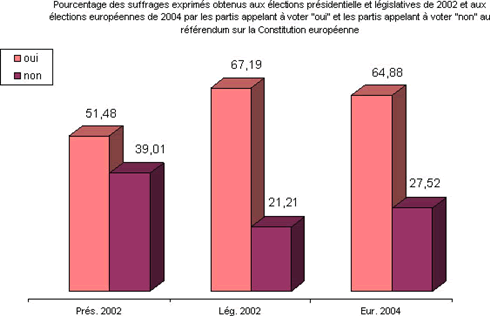
The referendum campaign
The campaign was marked by an interest the intensity of which was quite surprising and which bears witness notably to the success of the books dedicated both to the Treaty and on a wider scale, to European issues. The French certainly learnt much about the European Union before delivering it a heavy blow. As with the entire electoral campaign the quality of the debates was unequal. Many arguments against the Treaty had great effect without however being really founded – the best example probably being the questioning of the right to abortion. The main feature of this campaign was that it was dominated by fear and confusion in a general climate where the main problems encountered today by the French were blamed on a European text that had not even been applied.
Without aspiring to cover the entire debate it is possible to select two particular obvious arguments. They also reveal the state in which French society finds itself: the judgement of liberalism and the theme of "renegotiation".
The judgement of liberalism was the ideological event in this referendum campaign and certainly one of the reasons why the NO vote won. It ingeniously found support in the news that was full of boundless, particularly worrying reports and commentaries on relocations, Chinese textiles, the Bolkestein directive etc... And if the protest against liberalism succeeded in weighing so heavily on the campaign this was because it allowed the model of the market economy to be challenged without assuming a clearly "anticapitalist" position and simultaneously it enabled the Union's enlargement from 15 to 25 members to be questioned, without taking on a clearly anti-European stance. According to the debate, particularly on the left, everything occurred as if the market economy was trying to penetrate into France with the 29th May becoming the major battle field on which liberalism was to be kept from crossing our borders. This is how the leftwing NO vote linked up with the NO on the right. The demand for social protection by the State joined hands with the demand for national protection via the borders. The rhetorical figures of the "Polish plumber" ensured the interface between these two veins, one of which was "nationalist" and the other "social". The theory whereby those in favour of the NO formed a heterogeneous camp is highly questionable.
The theme of "renegotiation" was the second major argument on the part of the NO vote. Indeed it appears more effective to invite people to reject the suggested Treaty and promise another that would be better than to refuse all notion of the Union's progression. This was the theory behind the "European NO". And yet the French were led into this illusion. According to IPSOS 39% of the NO voters thought as they voted that "it would enable the renegotiation of a better constitution." The figure provided by the SOFRES poll is approximately the same (35%). On the other hand the victory of the NO vote hardly seems to have strengthened the belief in the theory of "Plan B" that would be to the advantage of France and French interests. In the monthly survey undertaken by SOFRES for Le Figaro Magazine (publication in the edition of 4th June 2005), the proportion of people interviewed who believed that "France's role in the world is diminishing" rose from 49% in May to 67% in June 2005 ( the survey was undertaken between 30th and 31st May).
The difficulties encountered by the YES vote.
The difficulties encountered by the YES camp can be explained by many reasons: an unfavourable economic situation, an unpopular government, the growth of dissidence in favour of the NO vote - but no dissidence in favour the YES vote from the parties calling to vote NO – the existence of a text, every line of which could be challenged, doubted and even manipulated whilst there was no text with which to compare the treaty since the supporters of the NO vote could not or did not want to embark upon the difficult road of making a proposal - except for Laurent Fabius who wanted to withdraw part three which would not have been effected by any result no matter what.
To these reasons we must also add airtime that was granted without considering the objective criteria of electoral representativeness. The 50/50 principle corresponding to a binary choice of YES or NO overawed the audiovisual media. Gradually they gave way to the simplistic logic and implacable appearance. This is how the political parties whose electoral influence is marginal and the parties on the extreme left and the Communist Party managed to pull off the amazing feat of enjoying nearly as much airtime as the parliamentary parties. The concern about parity grew to such a point that the CSA was in a position to ask the audiovisual media to grant airtime to the minorities in favour of the NO emanating from the parties supporting the YES vote. Since the opposite process did not occur the NO camp found itself strengthened. During the major TV debates that brought the YES vote supporters before the NO camp the various channels, constrained by parity, provided the same airtime to the parties that had rallied 24% of the vote during the general elections in June 2002 and to those who had rallied together nearly 70% of the votes cast.
An opinion, structurally, in favour of the NO vote.
If we take the polls into consideration over the entire period they reveal the structural nature of the NO vote. From the first time the two curves in favour of the NO vote crossed during March it was then no longer possible to re-establish the YES vote. The slight rise in optimism at the end of April and the beginning of May was short lived. The YES almost immediately gave its lead position away to the NO vote that nothing succeeded in threatening ; neither arguments, nor speeches by eminent personalities, nor that of Lionel Jospin, nor that of the President of the Republic, nor the publishing of surveys assuring the rejection of the Treaty.
According to IPSOS, 82% of the voters declared that they had made their choice "a few weeks ago" (25%) or "a few months ago"(57%). Likewise for the SOFRES, 23% of the voters said that they had made their choice "during the campaign", 56% "a long time ago" and only 8% "during the last few days of the campaign", whilst 13% said they had "hesitated until the last minute."
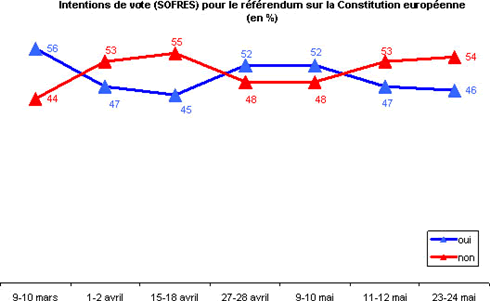
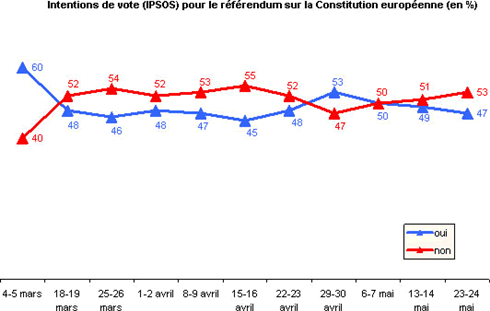
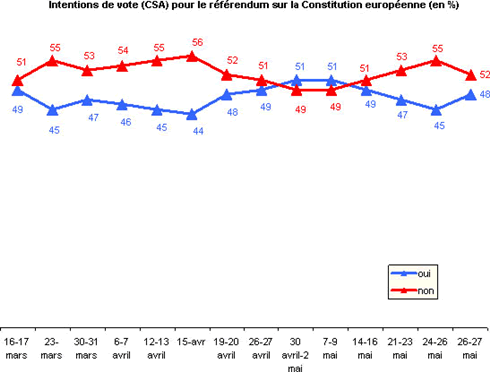
The French YES 1992 to 2005
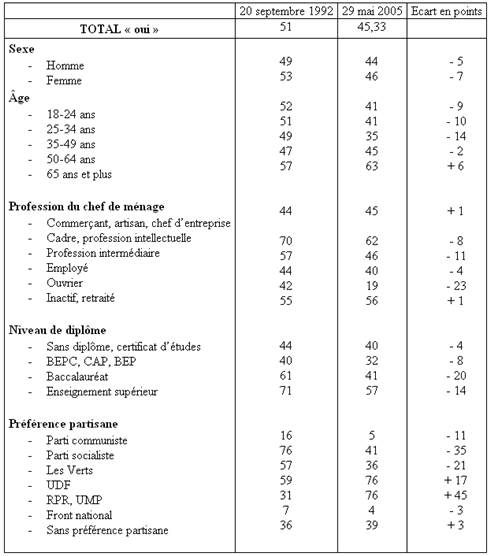 Sources: SOFRES, post electoral survey between 20th and 24th September 1992 amongst a national sample of 2000 people;
Sources: SOFRES, post electoral survey between 20th and 24th September 1992 amongst a national sample of 2000 people;
a SOFRES day of voting survey, amongst a national sample of 1500 people, for TF1/RTL/Le Monde.
The comparison between the two surveys undertaken by the SOFRES 13 years apart reveals the collapse of the YES supporters from one referendum to another. With the exception of voters aged 65 and over more of whom voted YES in 2005 the regression is a general one. It even affected the social categories which are generally more in favour of the European idea. Hence the regression is significant amongst the "executives and intellectual professions" (- 8 points), although the YES vote is still in the majority, and amongst the "intermediary professions" where the regression is the highest (- 11 points), whose clear YES in 1992 (57%) becomes just as clearly a minority in 2005 (46%). The collapse of the YES vote is just as spectacular amongst the qualified highly educated voters. This sociological bastion of support for Europe was not spared. The YES that triumphed amongst the qualified population in 1992 (71%), remains in the majority in 2005 (57%), but has regressed by 14 points.
Finally the collapse of the leftwing YES particularly amongst the Socialists (-35 points) and the Greens (- 21 points) was not compensated in quantity by the progression of the YES vote within the ranks of the UDF (+17 points) and the UMP (+45 points), showing yet again how this referendum was experienced as an opportunity to express a vote of sanction against the government and the ruling majority.
In spite of this terrible waste and the effects that cannot yet be forecast there are grounds not to despair. According to IPSOS 72% of the voters said that "they were completely or rather in favour in continuing the construction of Europe." This approval is almost general amongst the YES voters (97%), and also finds a majority amongst those who voted NO (57%).
Many Europeans today are discouraged before this landscape of devastation. It will take a lot of time and patience to try and repair the damage. Everything is possible given that we start again without delay.
Final Results (according to the Constitutional Council)

On the same theme
To go further
Elections in Europe
Helen Levy
—
24 February 2026
Elections in Europe
Helen Levy
—
10 February 2026
Elections in Europe
Corinne Deloy
—
20 January 2026
Elections in Europe
Corinne Deloy
—
13 January 2026

The Letter
Schuman
European news of the week
Unique in its genre, with its 200,000 subscribers and its editions in 6 languages (French, English, German, Spanish, Polish and Ukrainian), it has brought to you, for 15 years, a summary of European news, more needed now than ever
Versions :


